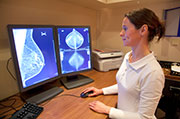- Double Mastectomy May Offer No Survival Benefit to Women With Breast Cancer
- Toxic Lead Found in Cinnamon Product, FDA Says
- Certain Abbott Blood Sugar Monitors May Give Incorrect Readings
- Athletes Can Expect High Ozone, Pollen Counts for Paris Olympics
- Fake Oxycontin Pills Widespread and Potentially Deadly: Report
- Shingles Vaccine Could Lower Dementia Risk
- Your Odds for Accidental Gun Death Rise Greatly in Certain States
- Kids From Poorer Families Less Likely to Survive Cancer
- Tough Workouts Won’t Trigger Cardiac Arrest in Folks With Long QT Syndrome
- At-Home Colon Cancer Test Can Save Lives
Experts Urge Routine Test for All Patients With Invasive Breast Cancer


MONDAY, Oct. 7All women with invasive breast cancer should be tested for the HER2 (human epidermal growth factor receptor 2) gene and protein, according to updated guidelines from two expert groups.
Breast cancers with extra copies of the HER2 gene or that have high levels of the HER2 protein tend to be more aggressive, faster-growing tumors. By identifying women with these traits, doctors can use therapies that are specifically targeted to HER2 tumors.
The new guidelines were just issued by the American Society of Clinical Oncology (ASCO) and the College of American Pathologists (CAP).
“In the growing area of personalized medicine, it is now more than ever critical to correctly identify the subtype of breast cancer affecting an individual, so that the right treatment can be given to the right patient,” said Dr. Antonio Wolff, co-chair of the panel that wrote the new guidelines.
“HER2 is among the first targets in breast cancer that helped define a very specific subtype of breast cancer that affects about 30,000 to 40,000 patients each year just in the U.S.,” said Wolff, a professor of oncology in the breast cancer program at the Johns Hopkins Kimmel Comprehensive Cancer Center, in Baltimore.
The new guidelines are intended to better standardize testing.
“The updated ASCO/CAP HER2 testing guideline will help further improve the accuracy of HER2 testing in breast cancer tumors, reduce the variability in the quality of testing that has been observed before and hopefully improve patient outcomes,” Wolff said.
The current guidelines are an update of the 2007 guidelines issued by the groups. Dr. Elizabeth Hammond, the other panel co-chair, said the biggest reasons for the update are that new evidence and testing methods have since been developed. Hammond is a professor of pathology at the University of Utah School of Medicine, in Salt Lake City.
Hammond said the vast majority of women — probably about 98 percent — with invasive breast cancers are already being screened for HER2, and that the tests for HER2 are widely available.
“Our responsibility is to make sure it’s done the same way following the same rules everywhere. We want to make sure that a woman living in a rural area has the same opportunity for testing as a woman living near a major medical center,” Hammond said.
The guidelines make the following recommendations:
- All women with an invasive breast cancer — cancer that has moved beyond its initial site in the duct or lobe of the breast — should be tested for HER2.
- Women with metastatic breast cancer — cancer that has spread to other parts of the body — should have their HER2 status tested to see if it has changed.
- Women with HER2-positive cancers should receive HER2-targeted treatment.
- However, women with HER2-negative cancers should not receive treatment with HER2-targeted treatments, such as trastuzumab (Herceptin), lapatinib (Tykerb), pertuzumab (Perjeta) or T-DM1 (Kadcyla).
- If the HER2 test results are inconclusive, testing should be repeated either with the initial tissue specimen or on an alternative specimen. Targeted treatment should be delayed until a definitive test can be done.
- Testing should be done with a U.S. Food and Drug Administration-approved test.
The guidelines also contain more detail about the types of tests, including a newer test called bright-field in-situ hybridization, for pathologists — doctors who specialize in the diagnosis of disease.
Hammond said the cost of testing is in line with other tests, and likely is only about several hundred dollars. The cost of targeted HER2 therapy, however, is quite expensive, she noted.
Dr. Stephanie Bernik, chief of surgical oncology at Lenox Hill Hospital in New York City, agreed that HER2-targeted therapy is expensive. She said it can cost $100,000 or more a year, so it’s important that the treatment is going to the women who will benefit most from it.
Currently, Bernik said, “not every institution does all forms of HER2 testing. The new guidelines are trying to standardize the testing, which makes more sense. Guidelines are helpful in ensuring that there’s less variability.”
Guideline panelist Hammond added that women who are newly diagnosed with invasive breast cancer should ask if the medical center where they’re receiving testing and treatment is following the ASCO/CAP guidelines. “If I were a patient with breast cancer, I would want to make sure that my tissue sample was examined by a facility that’s following the guidelines,” Hammond said.
The new guidelines were released online Oct. 7 in the Journal of Clinical Oncology and also appear in the Archives of Pathology & Laboratory Medicine.
More information
Learn more about HER2 testing and breast cancer treatments from the U.S. National Cancer Institute.
Source: HealthDay
Copyright © 2024 HealthDay. All rights reserved.










